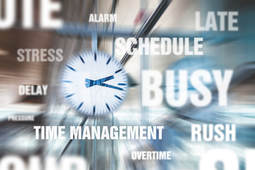 It was 7am on a Wednesday morning. I was on my way to our monthly book club meeting where I was leading a discussion on the book Rewire Your Brain for Love by Marsha Lucas. I turned on the radio to the Business Talk station and listen to an interview of a very successful woman executive and author. In the introduction, the interviewer listed her accomplishments, one after another—barely taking a breath while reading the exhaustive list, and said to the woman, “Wow, it really seems like you’re able to do it all.” To which the executive responded proudly, “Yes, the key is that I don’t waste any time during the day. If I’m on a flight, I’m writing a book. If I’m in the car, I’m catching up on my calls. Every minute is planned and productive.” It was a moment that made me cringe. I have to admit I passed judgment on her. I felt sorry for her! I wondered how many breakdowns she’s already had, and how stressful her life must be as she fills every minute of the day with “productive work.” Her message could not have been more opposed to what I was about to share at book club: the importance of slowing down, meditating, and being present in the moment. Many of the leaders I coach have Type A personalities and many are over-achievers. Although I admire them for their masterful work, many of them literally end up burning themselves out. One client stopped answering my emails only to find out later she was hospitalized for three weeks due to stress. The lifestyle is grueling. With meetings back to back during the day, and catching up on the hundreds of emails at night, one may think you need to work faster and harder to reach your productivity goals. As a coach, I would challenge this thinking and suggest you step back and slow down. Think about it, do you admire those leaders who run around like chickens with their heads cut off—or do you admire those leaders who remain calm in the midst of chaos? I have a magnet in my office that says the following: “Peace. It does not mean to be in a place where there is no noise, trouble or hard work. It means to be in the midst of those things and still be calm in your heart.” As I work with busy executives, we don’t explore actions to work faster. Instead, we examine ways to be productive and calm. One of the most powerful ways to achieve this is through meditation. And, the neuroscience supports this. Lucas presents the brain science behind human habits, patterns, and behaviors—and provides science-based guidance for “rewiring” the brain to support healthy patterns and strong, supportive relationships.
As Lucas explains, if you’re looking to change behavior, insight and intellectual thinking is helpful but short-lived. The most sustainable way to achieve a new state of being is through rewiring your neuropathways in your brain. And, this is done through meditation. Back to the book club! Our book club discussion was lively. (View the summary sheet to read an overview of the discussion, as well as a sample meditation from the book). We explored neuroscience and what exactly happens in the brain when we meditate. Fascinating stuff! The group—mainly leadership coaches, facilitators, and organizational development practitioners—was “sold” on the science and the benefits of meditation. And so we took the conversation to a practical level: What happens when, as a coach, mentor, boss, or colleague, you want to give the gift of meditation but the other person is looking for is the gift receipt? Here are a few tips on how to “sell” meditation and mindfulness to others who may be skeptics.
I encourage you to think about ways to become more mindful, present, and calm throughout the day. And, I’d love to hear what you experiment with. Send me a note to let me know what works for you and how you’ve been able to give others the gift of mindfulness or meditation.
0 Comments
Your comment will be posted after it is approved.
Leave a Reply. |
AuthorLaura Mendelow |
|
|
©2020. All Rights Reserved. Mendelow Consulting Group, LLC.

